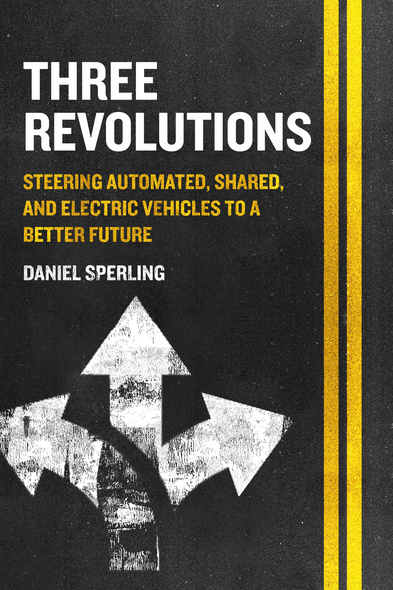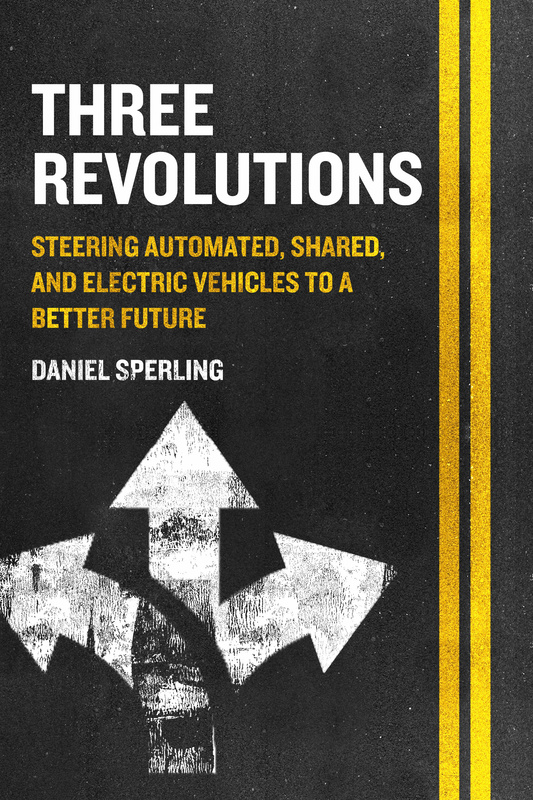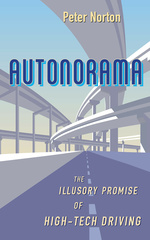
256 pages, 6 x 9
25 photos and illustrations
Paperback
Release Date:01 Mar 2018
ISBN:9781610919050
Three Revolutions
Steering Automated, Shared, and Electric Vehicles to a Better Future
Island Press
For the first time in half a century, real transformative innovations are coming to our world of passenger transportation. The convergence of new shared mobility services with automated and electric vehicles promises to significantly reshape our lives and communities for the better—or for the worse.
The dream scenario could bring huge public and private benefits, including more transportation choices, greater affordability and accessibility, and healthier, more livable cities, along with reduced greenhouse gas emissions. The nightmare scenario could bring more urban sprawl, energy use, greenhouse gas emissions, and unhealthy cities and individuals.
In Three Revolutions, transportation expert Dan Sperling, along with seven other leaders in the field, share research–based insights on potential public benefits and impacts of the three transportation revolutions. They describe innovative ideas and partnerships, and explore the role government policy can play in steering the new transportation paradigm toward the public interest—toward our dream scenario of social equity, environmental sustainability, and urban livability.
Many factors will influence these revolutions—including the willingness of travelers to share rides and eschew car ownership; continuing reductions in battery, fuel cell, and automation costs; and the adaptiveness of companies. But one of the most important factors is policy.
Three Revolutions offers policy recommendations and provides insight and knowledge that could lead to wiser choices by all. With this book, Sperling and his collaborators hope to steer these revolutions toward the public interest and a better quality of life for everyone.
The dream scenario could bring huge public and private benefits, including more transportation choices, greater affordability and accessibility, and healthier, more livable cities, along with reduced greenhouse gas emissions. The nightmare scenario could bring more urban sprawl, energy use, greenhouse gas emissions, and unhealthy cities and individuals.
In Three Revolutions, transportation expert Dan Sperling, along with seven other leaders in the field, share research–based insights on potential public benefits and impacts of the three transportation revolutions. They describe innovative ideas and partnerships, and explore the role government policy can play in steering the new transportation paradigm toward the public interest—toward our dream scenario of social equity, environmental sustainability, and urban livability.
Many factors will influence these revolutions—including the willingness of travelers to share rides and eschew car ownership; continuing reductions in battery, fuel cell, and automation costs; and the adaptiveness of companies. But one of the most important factors is policy.
Three Revolutions offers policy recommendations and provides insight and knowledge that could lead to wiser choices by all. With this book, Sperling and his collaborators hope to steer these revolutions toward the public interest and a better quality of life for everyone.
Highly readable and engaging.
Three Revolutions is a bold attempt to weave together the latest global developments in transportation, drawing on research in a variety of topics ranging from technology to economics to urban planning. Sperling and his colleagues make targeted recommendations for policy that can guide the new automated, electric, shared vehicles toward a bright future, while also sounding a clear warning about how these developments could actually make pollution, inequality, and congestion worse.
Three Revolutions is essential reading for anyone interested in how technology and mobility will shape our communities and our lives. This extremely timely book helps to inform the various decisions we need to make as these new technologies emerge. In Sacramento, we are implementing some of the innovative ideas in this book in an effort to lighten our environmental footprint and become a technology leader. Our cities need to define their own destiny as new opportunities emerge. This book shows us how.
Dan Sperling understands the mix of business, policy, and markets necessary for the transformational changes that will lead us to a greener future. He and his coauthors expertly show the importance of electrification and shared rides as global cities transition to automated vehicle technology.
Three Revolutions is a must-read for anyone who cares about guiding our cities to a safer climate future. A technological revolution alone will not get us there. This thoughtful book shows us how to drive policy change at the federal, state, and local level that will advance the three revolutions of electrification, automation, and pooling together While America waits for the return of strong federal leadership, we can and must make continue to make progress at all levels of government.
As Executive Director of the Transportation Research Board, I have an appreciation of the depth and quality of policy analysis and research that Dan Sperling and the other coauthors of Three Revolutions have contributed to this issue. They have clearly articulated and analyzed the choices we have in front of us and assessed the potential positive or negative consequences that might occur based on the policy choices that get made, or not made. These choices can make the difference between whether we have a safer, more sustainable, healthier, more livable, more equitable, and more economically viable future, or one where we are lamenting the negative consequences of the technological changes that have occurred. Three Revolutions gives us the insights needed to help make the wise policy choices.
Daniel Sperling is founding director of the UC Davis Institute of Transportation Studies and co-director of the National Center for Sustainable Transportation at UC Davis. He is a distinguished professor of civil and environmental engineering and environmental science and policy at UC Davis, and is a member of the influential California Air Resources Board.
Anne Brown is a researcher at the Institute of Transportation Studies at the Luskin School of Public Affairs at UCLA.
Robin Chase co-founded Zipcar and Veniam.
Michael J. Dunnefounded Dunne Automotive Ltd.
Steven E. Polzin is a professor of civil and transportation engineering at the University of South Florida, Tampa, and director of mobility policy research there.
Susan Shaheen is an adjunct professor of civil and environmental engineering at UC Berkeley.
Brian D. Taylor is a professor of urban planning and director of the Institute of Transportation Studies and Lewis Center for Regional Policy Studies in the Luskin School of Public Affairs at UCLA.
Levi Tillemannis a fellow at the New America Foundation and managing partner at the consulting firm Valence Strategic.
Anne Brown is a researcher at the Institute of Transportation Studies at the Luskin School of Public Affairs at UCLA.
Robin Chase co-founded Zipcar and Veniam.
Michael J. Dunnefounded Dunne Automotive Ltd.
Steven E. Polzin is a professor of civil and transportation engineering at the University of South Florida, Tampa, and director of mobility policy research there.
Susan Shaheen is an adjunct professor of civil and environmental engineering at UC Berkeley.
Brian D. Taylor is a professor of urban planning and director of the Institute of Transportation Studies and Lewis Center for Regional Policy Studies in the Luskin School of Public Affairs at UCLA.
Levi Tillemannis a fellow at the New America Foundation and managing partner at the consulting firm Valence Strategic.
Contents
Preface
Acknowledgments
Chapter 1. Will the Transportation Revolutions Improve Our Lives—or Make Them Worse? \ Daniel Sperling, Susan Pike, and Robin Chase
Chapter 2. Electric Vehicles: Approaching the Tipping Point \ Daniel Sperling
Chapter 3. Shared Mobility: The Potential of Ride Hailing and Pooling \ Susan Shaheen
Chapter 4. Vehicle Automation: Our Best Shot at a Transportation Do-Over? \ Daniel Sperling, Ellen van der Meer, and Susan Pike
Chapter 5. Upgrading Transit for the Twenty-First Century \ Steven E. Polzin and Daniel Sperling
Chapter 6. Bridging the Gap Between Mobility Haves and Have-Nots \ Anne Brown and Brian D. Taylor
Chapter 7. Remaking the Auto Industry \ Levi Tillemann
Chapter 8. The Dark Horse: Will China Win the Electric, Automated, Shared Mobility Race? \ Michael J. Dunne
Epilogue: Pooling Is the Answer
Notes
About the Contributors
Index
Preface
Acknowledgments
Chapter 1. Will the Transportation Revolutions Improve Our Lives—or Make Them Worse? \ Daniel Sperling, Susan Pike, and Robin Chase
Chapter 2. Electric Vehicles: Approaching the Tipping Point \ Daniel Sperling
Chapter 3. Shared Mobility: The Potential of Ride Hailing and Pooling \ Susan Shaheen
Chapter 4. Vehicle Automation: Our Best Shot at a Transportation Do-Over? \ Daniel Sperling, Ellen van der Meer, and Susan Pike
Chapter 5. Upgrading Transit for the Twenty-First Century \ Steven E. Polzin and Daniel Sperling
Chapter 6. Bridging the Gap Between Mobility Haves and Have-Nots \ Anne Brown and Brian D. Taylor
Chapter 7. Remaking the Auto Industry \ Levi Tillemann
Chapter 8. The Dark Horse: Will China Win the Electric, Automated, Shared Mobility Race? \ Michael J. Dunne
Epilogue: Pooling Is the Answer
Notes
About the Contributors
Index






